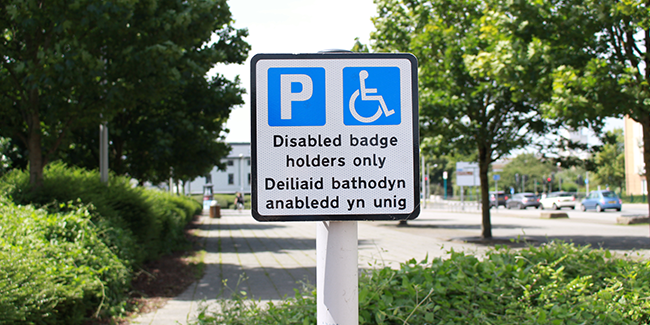Statutory guidance is needed to end the inconsistencies around assessing and granting of blue badges across Wales, according to the National Assembly’s Equality, Local Government and Communities Committee.

While the Welsh Government has issued guidance to local authorities it is not legally binding, meaning there are 22 different ways of administering Blue Badge schemes in Wales.
As an example, in some areas specialist occupational therapists are employed to assess applicants while others rely on assessments undertaken by lay staff.
Cancer charity Tenovus told the Committee:
“Some insist on clients making an appointment to complete an application, other areas allow our CSAs [Cancer Support Advisors] to send in an application on a client’s behalf. Some have paper based applications available online, others don’t. Some insist on assessments, others don’t. Some accept covering letters from CNSs [clinical nurse specialists], others don’t. Some accept covering letters from GPs, others don’t.”
In 2015 a task and finish group commissioned by the Welsh Government recommended that a central body co-ordinate delivery of the scheme to improve consistency. It is unclear what progress has been made in implementing some of the group’s recommendations made.
There is no formal way of appealing against a blue badge decision, but the Committee found that people can reapply with further information. Often this information is either confusing or not made available at all.
The Committee also found the process around renewing blue badges can be difficult and potentially invasive. While those who are automatically entitled to a blue badge do not need to re-apply, those who require further assessment, including people with degenerative conditions such as Alzheimers do, even where the condition is life-long.
“Blue badges provide a lifeline for a range of people in our society. Without them many would struggle to access essential services such as attending medical appointments,” said John Griffiths AM, Chair of the Equality, Local Government and Communities Committee.
“Difficulty in visiting shops and using leisure facilities diminishes their ability to lead independent lives and they could become more isolated and confined to their own homes.
“Differing arrangements across the 22 councils have led to inconsistencies in implementation across Wales.
Addressing this should be a priority for Welsh Government and local authorities so that everyone may receive a quality service, regardless of where they live.
“The system must be fit for purpose given its importance to our communities.”
The Committee makes 19 recommendations in its report, including:
- The Welsh Government should work with the Welsh Local Government Association to establish a statutory working group of local authority representatives for the Blue Badge scheme. Once established, the group should meet regularly to share knowledge and good practice in implementation. The group should include representatives with lived experience of the scheme to ensure that the views of those directly affected are represented;
- The Welsh Government works with the Welsh Local Government Association to develop a process to enable those suffering with a life-long or deteriorating condition to renew their blue badge automatically, without further assessment. The working group we have recommended be established would be an obvious forum to facilitate such discussions; and,
- The Welsh Government takes the necessary action so that Section 21 of the Chronically Sick and Disabled Persons Act 1970 is amended to require local authorities to put in place a ‘reconsideration’ or ‘review’ process to deal with applicants who wish to challenge the authority’s decision on a blue badge application. The amendment to that Act should include a power for the Welsh Ministers to make regulations and issue statutory guidance on the detail of the process.
The report will now be considered by the Welsh Government.
Read the full report:
Blue Badge Scheme in Wales: Eligibility and Implementation (PDF, 686 KB)

